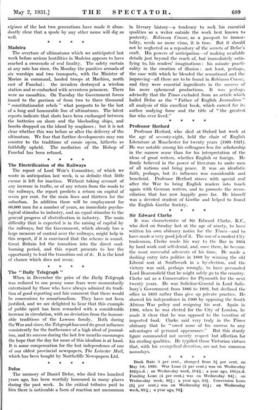Defoe The memory of Daniel Defoe, who died two hundred
years ago, has been worthily honoured in many places during the past week. In the critical tributes paid to him there is noticeable a form of reaction not uncommon in literary history—a tendency to seek his essential qualities as a writer outside the work best known to posterity. Robinson Crusoe, as a passport to immor- tality, needs no more visas, it is true. But it should not be neglected as a repository of the secrets of Defoe's craft. His powers of anticipation—of making available details just beyond the reach of, but immediately satis- fying to, his readers' imaginations : his minute practi- cality in the creation of illusion : not least, perhaps, the ease with which he blended the sensational and the improving—all these are to be found in Robinson Crusoe, and they were essential ingredients in the success of his more ephemeral productions. It was perhaps advisedly that the Times excluded from an article which hailed Defoe as the "Father of English Journalism" all analysis of this excellent book, which earned for its author undying fame and the title of "the greatest liar who ever lived."




































 Previous page
Previous page